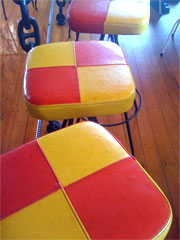When She Wants
I waited for her just inside the courtyard gate, watching the other kids find their parents or nannies, one by one. Buddy-roo walked out of the school dragging her feet, her heavy backpack a huge weight over her shoulders to  match her heavy heart. She’s a fine actress: not that she covers up her feelings but rather she can dramatize them to the fullest when it serves her purpose.
match her heavy heart. She’s a fine actress: not that she covers up her feelings but rather she can dramatize them to the fullest when it serves her purpose.
I offered an upbeat greeting, a big smile and how was your morning? in an attempt not to succumb to the gloom I knew she wanted me to see. As soon as we left the school courtyard and made it around the corner, she burst into tears.
“Today was the worstest day of my life!” She recounted, between sobs, how she’d been punished for something she didn’t know was wrong: playing games on the tablet in the media center (aka the library) when she was supposed to be using it to read a book. And that last week she had forgotten (neglected) to write down two important assignments in her agenda – two poems she had to memorize, one in French and one in Catalan – both she’d have to recite the next day. This is her biggest challenge at school, either she doesn’t pay attention when the assignments are given, or she doesn’t remember to write them down, or she doesn’t remember to do them. (Or all of the above.)
“I’ve really been trying hard to keep up with my homework but now I’ve ruined it all” she said, “and now I’m going to look stupid in front of everyone.”
She clamped her arms around me and buried her head in my coat.
“I didn’t want to move here,” she said, “Our life was just fine in Paris. The school there understood how I like to be taught. I never got yelled at. I’ve been yelled at four times already this year. And I never had so many things to memorize at once.”
“Sounds like you had a rough day,” I said, already dreading the afternoon. It was Wednesday, the day of the week she gets out of school early, so she had enough time to catch up on her homework, but I knew she’d want and need my help and I had other things I’d hoped to accomplish. Plus I’d purchased tickets for the two of us to attend the Custo show as part of Barcelona’s fashion week. She was thrilled when I surprised her with the tickets, it would be a mother-daughter outing and a special treat for her because she loves all things fashion. But if she didn’t finish the assignment, I couldn’t really justify the night out, on a school night no less. I had to be parental (I hate that).
Since Buddy-roo gets out of school just before lunch on Wednesdays, we’ve made it a ritual to stop at a favorite neighborhood cafè known for its frankfurters. This is also the moment each week that I allow her a Coca-cola. It’s always a prized moment for her: lunch alone with her mom, a hot-dog and a coke. I reminded her that this was ahead, on our way home,  hoping it would buoy her spirits. It did help to abate her tears, and a slight spring returned to her step as we walked toward the café.
hoping it would buoy her spirits. It did help to abate her tears, and a slight spring returned to her step as we walked toward the café.
“You know,” I said, once she was halfway through her hot-dog, “you’ll need to memorize both those poems before we go to the fashion show tonight.” I braced myself for her push-back: the usual resistance accompanied by complaints about having homework and being hounded to do it.
“I know,” she said.
What? No barrage of excuses or reasons not to? Could it be that she’s starting to accept responsibility for her work? Is little Buddy-roo growing up?
Later at home I let her lollygag for fifteen minutes before pressing her to start. I know sometimes I need to fuss a bit before I plunge in to my work; a few minutes of clicking on Facebook links and reading favorite blogs stirs my brain until I am warmed up. I gave her the 5-minutes-til homework warning, anticipating again her resistance but instead she walked into my office carrying her backpack, setting it down without any exaggerated sighs or even a hint of whining and retrieved from it the books she needed. We made a list of what she had to complete by six o’clock, the time we needed to walk out the door to arrive at the event on time.
“I’m really looking forward to the fashion show tonight,” I told her, “so I hope you can finish everything so we can still go.” I saw this as a gentle threat and hoped it would make clear the ultimatum, using a more positive tactic to avoid negative finger pointing, but still drawing the line.
She did a few short written assignments first, easy tasks but this permitted her to check some things off the list quickly. She attacked her work with an unusual efficiency. I’ve seen her spend an hour on a grammar exercise with only five phrases to fix, but now she was humming right along. When she started in on her poetry, I stared at my own to-do list, wondering how I would concentrate on it with her sitting on the floor behind me, reading her lines out loud. But she was taking such initiative that I didn’t want to spoil her momentum. What I wanted to write could wait until tomorrow. Instead, I’d clean out some of the emails in my inbox, something that didn’t require full concentration. 
If you’ve ever listened to a 10-year old memorize a poem, you know it’s a humbling moment for any of us with even the mildest aphasia. My steel-trap memory disintegrated during the production of my children’s placentas, and has never been fully recuperated. Hard facts I could once recall rapid-fire often sputter out or elude me all together. My reliance on Google search to look up things I already know is maddening. The other day I was telling De-facto about feminists I admired, and I could not for the life of me summon the name of the author of The Feminine Mystique. Only an iPhone search delivered Betty Friedan. Of course, I knew that. At a certain age, I suppose, there is a widening difference between knowing and remembering.
She started with the French poem, reading two lines out loud twice. Then she put the paper down and recited them. Two more lines, twice, and then the next. Within 20 minutes she could recite the whole poem by heart, without looking. The Catalan poem posed more of problem; she didn’t really understand what it meant, so she was mostly memorizing sounds. But her accent was impeccable, or it least it sounded sharp and confident to me. She learned the second poem almost as quickly. It wasn’t flawless, she had to peek once in a while, or ask for a one-word prompt to remember the line that followed. More important than reciting the poems perfectly – both were still a little bit bumpy – was the way she’d attacked them: vigorously and without getting distracted. It’s rare that she works so diligently. She must have really wanted to go to that fashion show.
We had quasi-VIP passes. We met my Spanish teacher – this excursion was part of a culture and language program – in front of the Mercat del Born, an old covered market that, during a renovation had revealed a tract of Roman ruins. Construction was halted and the the building was turned into an archeological museum and library. This was the location of Barcelona’s fashion week events, with a catwalk that wrapped around the dugout of ruins. We first went for some tapas at a nearby café, to go over some Spanish vocabulary pertaining to the world of la moda, fashion. When we returned, we were skirted to the front of the long line snaking outside the market, and ushered to our seats, a few rows back from the catwalk. Buddy-roo delighted at the flashing lights and the pulsing music, the models sashaying by, sporting next year’s collection. And Custo happens to be a  favorite brand of mine, even before I moved to Spain. There was a Custo store on our street in Paris; its merchandise fit well my bohemian chic taste in clothing and occupied a large part of my closet until that store closed a few years ago. Fashion savvy Buddy-roo assessed each model as she strutted by, rating each outfit by its originality and style, and of course, whether or not she’d wear it. At the end of the show, when all the models paraded by, followed by the designer himself, she turned to me with the look of supreme satisfaction.
favorite brand of mine, even before I moved to Spain. There was a Custo store on our street in Paris; its merchandise fit well my bohemian chic taste in clothing and occupied a large part of my closet until that store closed a few years ago. Fashion savvy Buddy-roo assessed each model as she strutted by, rating each outfit by its originality and style, and of course, whether or not she’d wear it. At the end of the show, when all the models paraded by, followed by the designer himself, she turned to me with the look of supreme satisfaction.
After, the fashionista crowd gathered in a tent outside the venue. I wouldn’t have minded to stay and quench my thirst, but the next day was a school day so Buddy-roo and I made our way through the throngs of well dressed people out to the street to find our taxi home. We flagged one down and slid into its back seat together. Buddy-roo threw her arms around me and gave me a fierce hug.
“This was the bestest night of my life. I’ll never forget it!”
My father used to offer me a particular piece of unsolicited advice: how I should tone down the highs and bring up the lows, just to try to take life a bit more evenly. I never appreciated his suggestion. I liked the thrill of elation too much and was prepared to pay for it with the pendulum swing of emotions. Of course now I can understand his advice, guiding Buddy-roo through the worst day and the best night of her life, but I know better than to offer it to her.
“It was a great night, wasn’t it?” I said. “Thanks for learning your poems so we could go out.”
Right then and there, in the back of the taxi whizzing through the Barcelona streets, she recited both poems for me, flawlessly. She truly has a brilliant memory, when she wants.


February 11th, 2014 at 5:46 pm
Holy crap! That girl is a genius. Memorizing two foreign language poems in such a short time. I have been working on Stop the clocks by Auden since New Year’s Day and am only now putting it all together. Of course Buddy Roo is 10 and I am 72. Just might be the difference.
February 12th, 2014 at 11:02 pm
Ah, elation and despair..and nothing can bring it on more quickly than a forgotten name or word….or song fragment, or who wrote that novel or played that role that I know as well as my own name…. Memorization – we should continue to do it at every decade of our lives…. om mani padre hum.
Lee